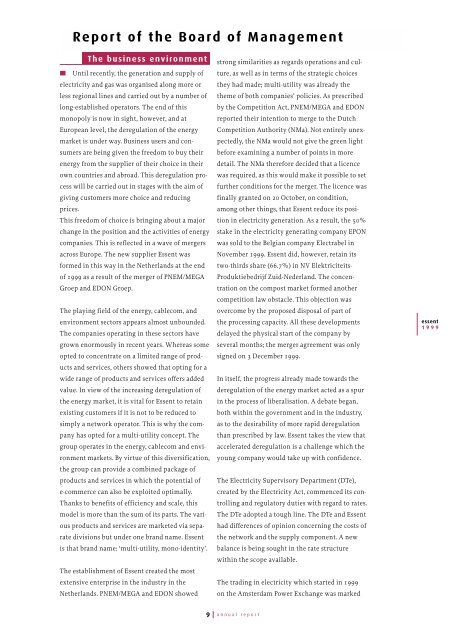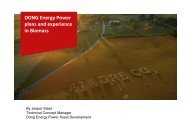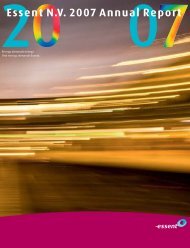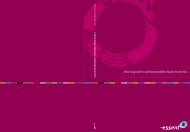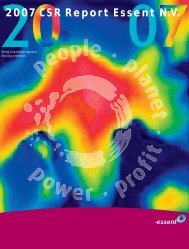Annual Report 1999739KB - Essent
Annual Report 1999739KB - Essent
Annual Report 1999739KB - Essent
Create successful ePaper yourself
Turn your PDF publications into a flip-book with our unique Google optimized e-Paper software.
<strong>Report</strong> of the Board of ManagementThe business environment Until recently, the generation and supply ofelectricity and gas was organised along more orless regional lines and carried out by a number oflong-established operators. The end of thismonopoly is now in sight, however, and atEuropean level, the deregulation of the energymarket is under way. Business users and consumersare being given the freedom to buy theirenergy from the supplier of their choice in theirown countries and abroad. This deregulation processwill be carried out in stages with the aim ofgiving customers more choice and reducingprices.This freedom of choice is bringing about a majorchange in the position and the activities of energycompanies. This is reflected in a wave of mergersacross Europe. The new supplier <strong>Essent</strong> wasformed in this way in the Netherlands at the endof 1999 as a result of the merger of PNEM/MEGAGroep and EDON Groep.The playing field of the energy, cablecom, andenvironment sectors appears almost unbounded.The companies operating in these sectors havegrown enormously in recent years. Whereas someopted to concentrate on a limited range of productsand services, others showed that opting for awide range of products and services offers addedvalue. In view of the increasing deregulation ofthe energy market, it is vital for <strong>Essent</strong> to retainexisting customers if it is not to be reduced tosimply a network operator. This is why the companyhas opted for a multi-utility concept. Thegroup operates in the energy, cablecom and environmentmarkets. By virtue of this diversification,the group can provide a combined package ofproducts and services in which the potential ofe-commerce can also be exploited optimally.Thanks to benefits of efficiency and scale, thismodel is more than the sum of its parts. The variousproducts and services are marketed via separatedivisions but under one brand name. <strong>Essent</strong>is that brand name: ‘multi-utility, mono-identity’.The establishment of <strong>Essent</strong> created the mostextensive enterprise in the industry in theNetherlands. PNEM/MEGA and EDON showedstrong similarities as regards operations and culture,as well as in terms of the strategic choicesthey had made; multi-utility was already thetheme of both companies’ policies. As prescribedby the Competition Act, PNEM/MEGA and EDONreported their intention to merge to the DutchCompetition Authority (NMa). Not entirely unexpectedly,the NMa would not give the green lightbefore examining a number of points in moredetail. The NMa therefore decided that a licencewas required, as this would make it possible to setfurther conditions for the merger. The licence wasfinally granted on 20 October, on condition,among other things, that <strong>Essent</strong> reduce its positionin electricity generation. As a result, the 50%stake in the electricity generating company EPONwas sold to the Belgian company Electrabel inNovember 1999. <strong>Essent</strong> did, however, retain itstwo-thirds share (66.7%) in NV Elektriciteits-Produktiebedrijf Zuid-Nederland. The concentrationon the compost market formed anothercompetition law obstacle. This objection wasovercome by the proposed disposal of part ofthe processing capacity. All these developmentsdelayed the physical start of the company byseveral months; the merger agreement was onlysigned on 3 December 1999.In itself, the progress already made towards thederegulation of the energy market acted as a spurin the process of liberalisation. A debate began,both within the government and in the industry,as to the desirability of more rapid deregulationthan prescribed by law. <strong>Essent</strong> takes the view thataccelerated deregulation is a challenge which theyoung company would take up with confidence.The Electricity Supervisory Department (DTe),created by the Electricity Act, commenced its controllingand regulatory duties with regard to rates.The DTe adopted a tough line. The DTe and <strong>Essent</strong>had differences of opinion concerning the costs ofthe network and the supply component. A newbalance is being sought in the rate structurewithin the scope available.The trading in electricity which started in 1999on the Amsterdam Power Exchange was markedessent19999annual report


